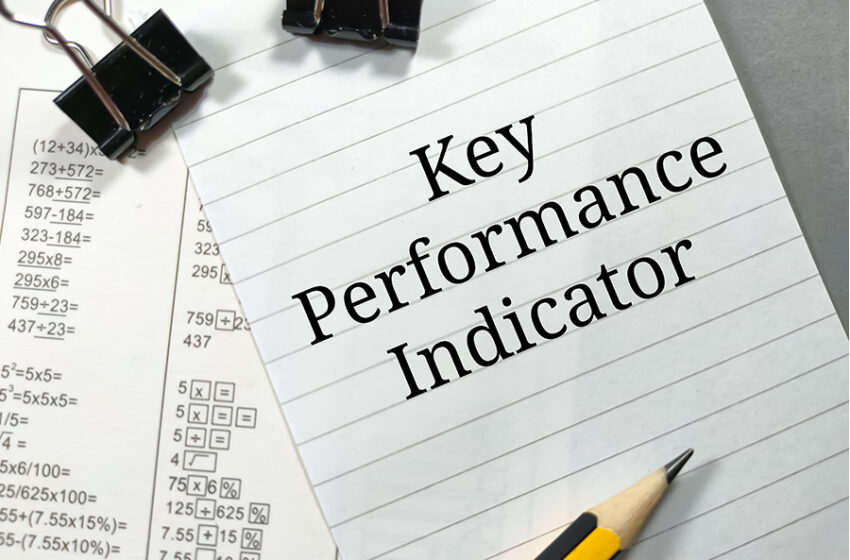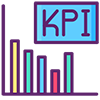KPI in Digital Marketing

What Is a KPI in Digital Marketing
A key performance indicator (KPI) in digital marketing is a metric that helps you track results. More specifically, it’s a quantitative benchmark that enables you to measure your progress against your goals.
Why Use a KPI in Digital Marketing
 Without KPIs, it can be hard to tell whether your marketing is working or not. Metrics make things like traffic, clicks, or engagement measurable. They enable you to adjust and fine-tune your digital marketing strategy to get the best results.
Without KPIs, it can be hard to tell whether your marketing is working or not. Metrics make things like traffic, clicks, or engagement measurable. They enable you to adjust and fine-tune your digital marketing strategy to get the best results.
Let’s take as an example a start-up that wants to drive social media engagement to spread brand awareness and connect with customers. The company can use specific KPIs to define its goals:
- 15,000 Facebook fans by [date]
- 3,000 Facebook Likes by [date]
- 1,000 Facebook shares by [date]
- 20,000 site visits from Facebook by [date]
These KPIs are SMART. They are Specific, Measurable, Achievable, Relevant, and Time-Bound.
How to Choose the Right KPIs
There is a huge number of KPIs in digital marketing. But you don’t want to track all of them. Instead, it’s usually best to focus on the KPIs that are most relevant to you. Here are some examples.
Social Media KPIs
- Reach, or how many people see your posts
- Followers and Active Followers
- Impressions, or how many times your content is displayed
- Comments
- Shares
- Likes
- Traffic
- Mentions
Content Marketing KPIs
- Organic traffic
- New leads
- Time on page
- Opt-ins
- Bounce rate, or the rate at which visitors leave your site immediately after landing on it
Search Engine Optimization (SEO) KPIs
- Website traffic
- Organic traffic
- Time on site
- Links built
- Pageviews
- Page and domain authority
At the end of the day, the most important KPI in digital marketing is the return on investment (ROI). To calculate ROI, add up all your digital marketing costs and see whether the results it brings you offset them.
How to Track KPIs
![]() Regardless of the KPIs you choose, you want to track them weekly and monthly. Tools like Google Analytics make it easier for you to track a wide range of KPIs in one place.
Regardless of the KPIs you choose, you want to track them weekly and monthly. Tools like Google Analytics make it easier for you to track a wide range of KPIs in one place.
There are also plenty of other marketing tools that enable you to set and track KPIs. But you can also use good old-fashioned spreadsheets.
Monthly or biweekly, you can review your KPIs to determine whether your marketing is on track. If not, you can adjust your marketing to improve results.
Let’s say that after 1 month, the owner of the startup we mentioned earlier notices that his Facebook page gets relatively few shares on Facebook compared to Likes and traffic.
Using the KPI metric for shares, he or she can start creating different types of content and explore new topics. They can also make the content more personal and their headlines more enticing to increase shares.
KPI in Digital Marketing – The Bottom Line
KPIs give your digital marketing a clear direction. They enable you to quantify results and test different strategies to ensure you accomplish all your marketing goals.
You want to take the time to consider the KPIs that are most relevant to you. That way you will know what to focus on at any given time to optimize results. You will stay in control of your digital marketing.
KPI in Digital Marketing – Additional Resources
- Google Analytics – Set up and customize measurement for websites, web and mobile apps, and internet connected devices.
- Google SEO – If you own, manage, monetize, or promote online content via Google Search, this guide is meant for you. You might be the owner of a growing and thriving business, the website owner of a dozen sites, the SEO specialist in a web agency or a DIY SEO expert passionate about the mechanics of Search: this guide is meant for you.